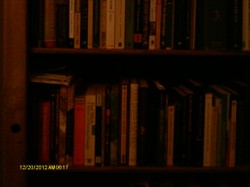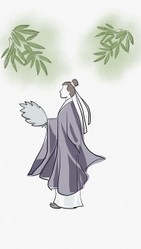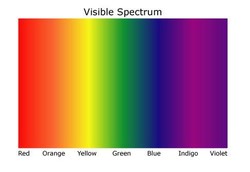As writers we are involved in a process of self-expression, in which the contents of our minds, real or imaginary, are poured out and crafted in literary form. Every piece of literary work is a self-revelation, for when we write we tell readers what is in our conscious and possibly subconscious minds. We reveal not only our thoughts, but our values,we share with others what we enjoy and indicate what we dislike, and we do so by the linguistic suggestions in the way we write. Readers are the other end of the writing process, for they receive our literary creations, and either accept or reject them, making them part of their mental lives or part of a world that they reject. Thus reading is a process of discernment, of acceptance or rejection, critical or uncritical.

What is happening when we read
by frankbeswick
Reading involves sharing the author's values and experiences and making them part of your life.
Why We Write.
When I was doing my Philosophy master's degree many years ago the ethics tutor set us a coursework essay, "It's disgusting,obscene and outrageous, but what's morally wrong with it?" This was one of several essay choices, of which we had to select three, and one that I chose, for I had already decided that my preferred life path was writer. The essay writing process led me to an analysis of not only what happens when we read, but what is a writer doing when he/she writes.
Let us take for example my articles on walking What do you discern about me from the fact that I write about walking in beautiful places? You pick up that I am a lover of nature and value natural beauty greatly, I love quietness and silence, but I relish the natural sounds that I hear, like the music of a tiny waterfall and the sounds of birds, and the fact that I liken them to music suggests to you that I value sensitive and beautiful music, so no fan of Death Metal then! Would it surprise you that my favourite instruments are the harp and uillean pipes, and that I love new age music inspired by nature and Celtic music, the sounds of Scotland, Wales and Ireland? But that's to be explained by the fact that Celtic blood runs strong in me.
You would also note that I comment on the history and the natural surroundings of the areas in which I walk. My historical love is archaeology, but I have wider historical interests and am keen on nature and green issues, such as gardening. Other articles reveal my religious side, and I am strict in my ethical views. But you note how when I write about religion I tend to deal with fundamental problems, like the existence of God or the nature of faith, but that's the philosopher in me coming out.
So what is happening is that you are getting my mind on paper. I am sharing my intellectual and emotional life with you all. I am revealing myself in a process of self-disclosure. But in this way I am no different from any of you all, for that is what you are all doing. I am trying in some articles to show you my responses to serious issues that concern me; and in other articles I am communicating my emotional enjoyment of walking and gardening, and I am doing so that you might share it. But I also reveal my limitations, for there are issues on which I do not write, and they are many.
But the writer not only shares beauty and truth in his/her content, but in the quality of the language. A true writer engages readers with language crafted for its beauty, and possibly allies it with beautiful or truthful visual images.So truth and beauty work on at least two levels, what is said and how it is said.
A Celebration of Beauty and Truth
 |
| Shoots Out of Eden - Christian Monastic Gardening in the British Isles |
From the Reader's End
So why do you select the works that you like to read? Only you can account for your choices, but if I look back to my early years I notice that I was never smitten with the books that conventional English teachers wanted me to read. In the 1960s there arose a movement to give children socially realistic literature, which spoke to them of their own experiences, which in my case would be life on Europe's biggest council estate. Some people love this kind of social realism, but that's their emotional agenda. As for me, I wanted different things, experiences that took me away from the mundane and ordinary, away from the dull estate into different worlds. I sought them in historical novels and non-fiction, in travel books, and I loved science and some science fiction, though I came to fantasy somewhat older. I let my mind range through distant places and times. We select works of literature, be they books, stories or articles, by discovering writers whose works match our emotional agenda and therefore meet our needs.
What always struck me is that I could never read a book just because someone recommended it. If I feel that I ought to read a book, I find it difficult to concentrate. I have to want to read a book or an article to enjoy it.
What is happening is that when we read we construct our mental lives. We also construct our language, for what we read shapes how we express ourselves. We create the mental world that we want to live in; and we can do this through fiction or non-fiction.We create characters who interest us and with whom we can identify, through whom we explore how we want to live and who we truly are. In non-fiction we explore lives that we find meaningful,possibly living vicariously the life that we would like to lead. We may explore other cultures and thus widen our horizons. I have made a point of studying all the religions of the world. It is an endless task, but a mind-broadening one that meets my interest in religion and my emotional need to study more of it. There is a vicarious element in much reading. We read about our heroes, the people who we would like to be, who do the things that we would like to do, at least to some extent. We read about larger than life characters who have the adventures that we would like to have. We also read to discover new information or deepen our knowledge of the belief system to which we are committed. For example, I read theology to become more of a Christian thinker and a better one.
But our reading can also limit us. At certain stages of life we have to construct our emotional and social lives, our teens for example, and I know that my reading at that stage was masculine, to the extent that It limited my emotional growth. I could have done more to learn about emotional relationships.
The Dark Side
A true writer tries to realize in print the True, the Good and the Beautiful, or at least a tiny spark in the great radiance of this triad. But there are works of fiction and non-fiction that work for the dark side. Mein Kampf,for example, cannot be a work that reveals the True, the Good and the Beautiful and it led those who accepted it to disaster. Julius Streicher used his newspaper to publish anti-Semitic writings, many of which were too filthy to describe on Wizzley. But Hitler is not alone, for there are other works that oppose this triad of values. Pornography, for instance, presents a false view of human relationships, offering pleasure when what it shows is a path to unhappiness, degrading not only women, but also the men who use it, for its readers are invited to vicariously share in a wrongful way of life and sometimes told that very wrongful acts, such as violence, are a source of pleasure, and they can lead those who believe them to disaster, along with their victims. Some guide books that show you how to succeed in business can recommend immoral ways of working. Writings can therefore contain lies and anti-values, and those who read them absorb not the True the Good and the Beautiful, but the False, the Bad and the Ugly, and these can have mind poisoning effects, for those who take them into their emotional lives are damaged in the process.
Here the reader comes to a challenge. When we encounter literary material that contains anti-values, we can approach critically with a sense of rejection, or we can enthusiastically participate with our imaginations in the work. The critical response to such works is a safe one, but the path of acceptance and participation leads to spiritual and emotional danger.
This leads us to a vitally important point: we become by doing; we shape our characters by our actions. Aristotle, writing in Ethics, makes this point: we learn to be just by doing just things. Every book or article you read makes you into the person that you are. You create your personality by everything that you do,for good or for ill. This is an existentialist viewpoint, and I consider that it provides us with a powerful guide to life, for it shows us that we cannot be negligent of the influences that contribute to creating our characters. To use Buddhist terminology, we must be mindful about the little influences upon us, the sort of influences that we sometimes overlook.
While many of you know implicitly what I am saying, I hope that this article will serve to enable writers to reflect on their task, giving them a tool to enable reflection. I have been attempting to pass onto you the work that I did for my masters course, hoping that it will be of value
I conclude by saying that here on Wizzley all the writing is positive,for all who write here are implicitly aiming to realize the True, the Good and the Beautiful. We all succeed to some degree, for none of us is perfect. But even our imperfections are merely lesser forms of success.
You might also like
Philosophy for Gardeners: a reviewPhilosophy for gardeners is a unique and enjoyable book well worth reading ...
The Spectre at the Feast: reflections on the Peterhouse GhostThe Peterhouse ghost caused quite a stir in an ancient Cambridge College
Black and White IS NOT a color: It's a StatusThe human race mistakes this fact for SKIN color on a regular, daily basis.






 Pilgrimage. A reviewon 06/15/2025
Pilgrimage. A reviewon 06/15/2025
 Leo the Fourteenthon 05/09/2025
Leo the Fourteenthon 05/09/2025
 The Melsonby Hoardon 03/25/2025
The Melsonby Hoardon 03/25/2025




Comments
Religious Studies
Thank you for your comment below in answer to my previous observation and question.
Educational materials intrigue me. What might their subjects have been?
I love writing, but My best writing is in articles, followed by short stories. I have Written educational materials, which are now out of print.
Thank you for your comment below in answer to my previous observation and question.
Your wizzleys/wizzlies mention prose writing, such as your short stories and your unrealized novel about Pontius Pilate. You released a Brexit-related wizzley with a poem.
Would poetic reading and writing interest you less than, more than, the same as prose reading and writing?
I have always loved reading, so that was the root ofbwriting.
The first paragraph to the first subheading, Why we write, advises us that "I had already decided that my preferred life path was writer."
Was there one thing in particular or were there several or many things by which you wended your way into the writing life path?
I agree with you that books shape us tremendously. I have a number of books that I've read several times in order to ponder more on issues that made an impression the first time, and each time I delved further into said books, and took more out of them (ideas that connected to where I was in life and what I had read up until that point), and sometimes I found that some of my path of discovery and development coincided in some way and to some extent with that of my favorite authors. Do you read again books that you love?
I cannot remember the grade, but I got a good pass on the course, and I passed the master's degree. I cannot remember all the options, sorry.
frankbeswick, Thank you for the explanation by offering yourself as example and for including that wonderful reference to Aristotle.
What grade did you get on the essay? what were the other topic options?
You remind me of a good friend, an English professor, who knows much about many topics, and has great depth. You have many facets, and are quite interesting. I started reading your work for an insight into England, and now find much more of interest there.